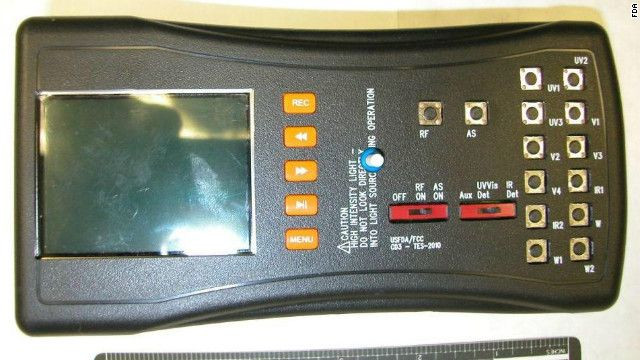FDA Unveils New Device that Detects Fake Drugs

The Food and Drug Administration Monday unveiled a new device capable of detecting fake drugs.
The device, called the Counterfeit Detection Device No. 3 (CD3), emits light in 10 different wavelengths, both visible and invisible. It can be used on drugs, powders and inks.
The CD3 can also be used to check if the product is tampered or resealed. Counterfeit products appear in a different shade, CNN has reported. The device is portable and is battery operated.
"This device was designed in-house by FDA scientists in response to the needs for screening in the field. It is low cost compared to other analytical devices, operates with batteries, and requires minimal training to use. It allows for 'real time' comparisons with authentic drugs - and has already proven useful for identifying counterfeit drugs at our busy international mail facilities," said FDA Commissioner Dr. Margaret Hamburg, CNN has reported.
The device has been used to detect drugs like Crestor, Lipitor, Oxycontin, Viagra, Tamiflu, Singulair, Plavix and Wellbutrin.
A few years ago, a U.S. drug distributor announced the recall of 130,000 bottles of counterfeit Lipitor. This recall remains one of the most publicized counterfeit medicine cases in the country.
Hamburg has said that thirty percent of drugs and medical devices are made outside the country and about 80 percent of the active ingredients in the drugs made in the U.S. are manufactured in other countries.
"In total, some 300,000 foreign facilities spread across 150 countries are sending FDA-regulated products to our shores. And, these products now account for approximately 11% of all U.S. imports," Hamburg said to CNN.
The device is currently being used to check the presence of counterfeit or unapproved drugs, cosmetics, medical devices and cigarettes at 50 different FDA field labs across the country.
FDA facing budget cuts
However, the device research might face roadblocks in the future as the FDA is facing an 8 percent cut in funding, according to MedPage Today. Hamburg has said that FDA is in a position to address gaps in medical research.
"The science we do is not always viewed as essential and unique in the funding process, but it is and it needs to be supported and needs to be strengthened," Hamburg said to MedPage Today.
Published by Medicaldaily.com



























